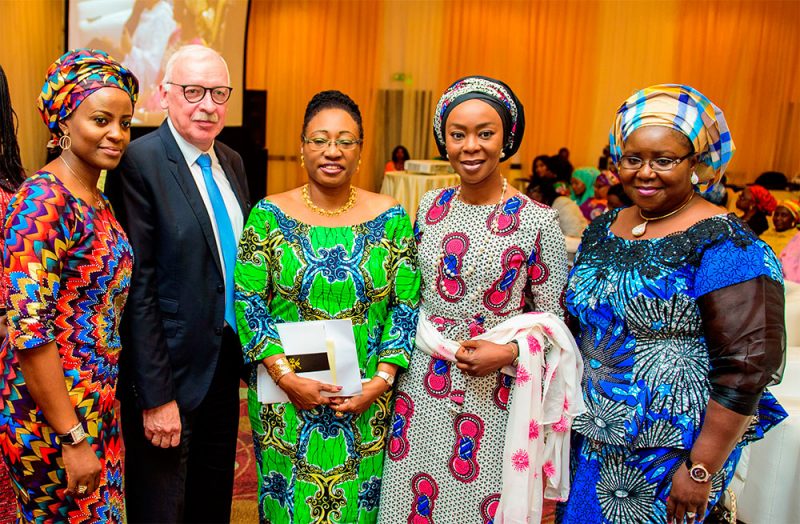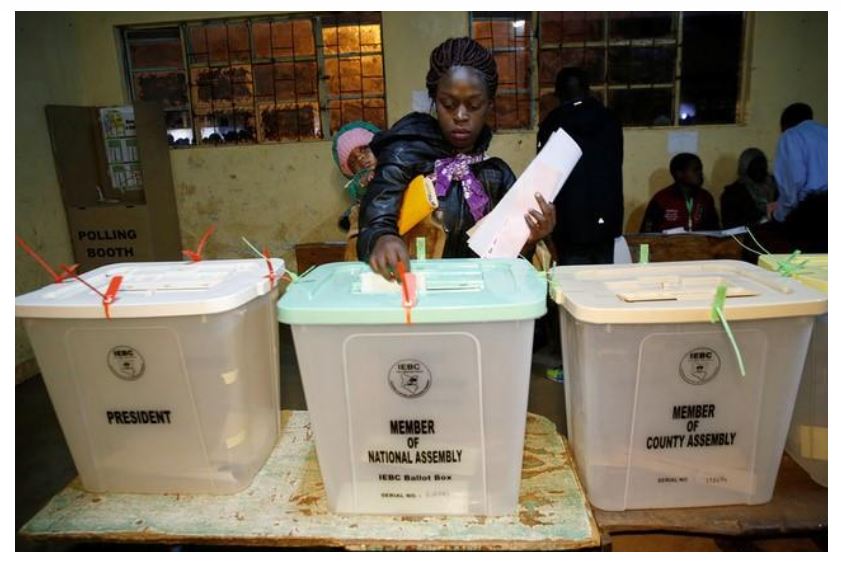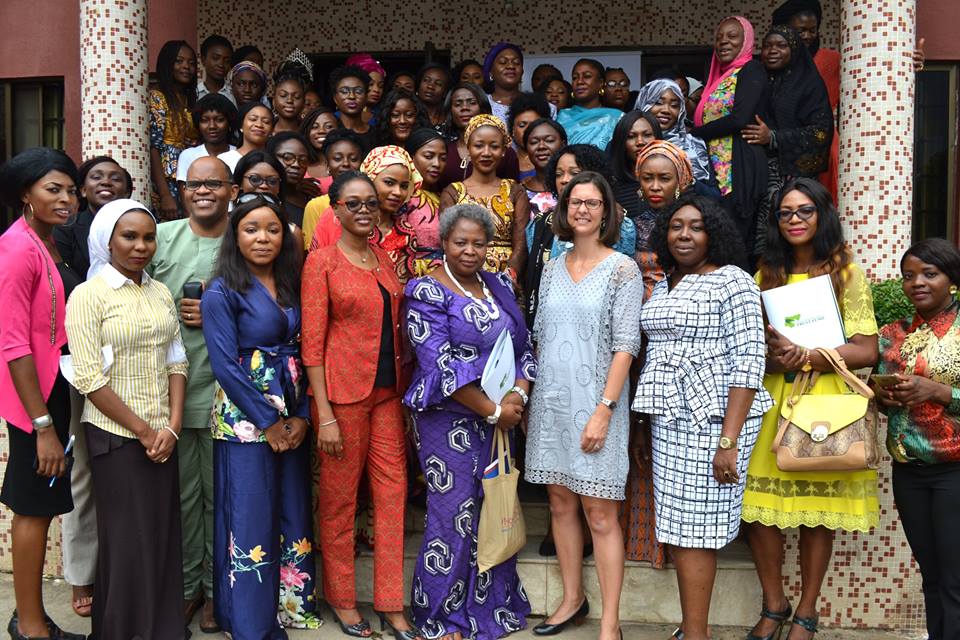Nigerian women possess leadership traits needed to drive the nation into prosperity. But to harness these, they must be given the opportunity, according to the Head of the European Union (EU) Delegation to Nigeria and ECOWAS, Ambassador Ketil Karlsen. At a seminar on women’s participation in Nigeria’s political process held in Abuja, Ambassador Karlsen said it was an irony that the Nigerian women noted for their courage and outspokenness are relegated to the background in the politics of their country.
The event hosted by the EU to mark this year’s International Women’s Month, brought together eminent female politicians and other politically-conscious women and civil society actors from across the country to discuss the fate of women politics. It had had the theme, “How do Women Win Election in 2019?” Among those in attendance were the wife of the Senate President, Mrs. Toyin Saraki, Senator Binta Garba, who chairs the Senate Committee on Women Affairs, and Mrs. Bisi Fayemi, leading gender activist and wife of Minister of Solid Minerals.
Welcoming participants to the seminar, Ambassador Karlsen said the idea was to discuss how to get women in the country to be more educated in politics, promote their rights and make sure there are better opportunities for them. . “We are opening the door a little bit. We are reminding ourselves that women’s right is not only for speeches at occasions. It is something that should guide our works and our lives every day of the year.”
Much as gender imbalance is not a peculiar Nigerian problem, the EU Head of Delegation said the country would be short-changing itself by not making the political more space inclusive to enable women to contribute in shaping its destiny. “The statistics in this particular country makes it very clear: only six female senators, if I’m not mistaken, 15 female members of the House (of Representatives) and five (female) deputy governors in this great country, the biggest country in Africa. We need to ask ourselves whether this is good enough.”
Relieving her experience in politics, Sen. Garba said her path has been dogged by the same factors that have made the political arena hostile to women with political ambitions. “Culture was against me, religion was against me. Women were used against me,” she said.

It did not help that she hailed from Adamawa state and was campaigning in a constituency that was predominantly Muslim while she was Christian. But Sen. Garba said she stood her ground. While respecting the institutions and the religious leaders, she said she did what was needful, and those things she did spoke for her when it mattered most: “With those little things I was doing within my community, it was the women that stood their ground and said, even when Binta was nobody, she made some certain inputs towards their livelihood. That was how I became a member of House of Representatives.”
She also had to deal with hostility of Imams and even church leaders, who questioned why she should contest election in Kaduna. “But, within me, I have this fighting spirit, and I told myself that I must be the voice of those voiceless women, whatever it would cost, I would never, never succumb to any pressure whatsoever.”
Sen Garba came to the House of Representatives as the youngest of all 360 members in 1999,at barely 28, and she put it down to her persistence, focus, determination and refusal to succumb to intimidation and frustration n account of her gender. “It might not be today, but someday, somehow, I know that women in Nigeria will definitely stand up with men.”
Sen. Garba who has been a federal lawmaker since Nigeria returned to democracy in 1999 said in 2006, former Governor of Adamawa state, Boni Haruna, asked her to contest for the Senate in her home state of Adamawa, and promised to assist her. Sen. Garba has been a senator representing Adamawa North since then.
She urged women to be firm when they are interested in politics and be close and fair to their constituents. While appealing to all women in the country to vote for their fellow women who show interest in politics, irrespective of their political affiliations, she urged that the “35% Affirmative Action” which seeks the allocation of 35 percent of all political offices to women be enshrined in the nation’s constitution and in political parties’ constitutions.
Mrs. Saraki expressed delight with the release of the abducted Dapchi girls, and described the loss of five of the girls as unfortunate. “I want to say that those who seek to intimidate our girls and women and prevent them from accessing education or fulfilling their potentials would never succeed in Nigeria,” she said.
Citing a recent US Agency for International Development’s (USAID) report, she said: “When 10 per cent of girls go to school, a country’s GDP on the average increase by 35 per cent. When women have the same amount of land as men or ownership of land, there is over 10 per cent increase in crop yield.”

The wife of the Senate President said allowing women to make good use of their potentials yields good dividends to any nation, adding that they should not be deterred from making needed contributions to nation building through politics. According to her, the UN estimates that gender inequality costs Sub-Saharan Africa an average $95 billion yearly.
In a keynote presentation, the Senior Programme Manager, Global International Idea’s Programme on Political Participation & Representation (Sweden) Rumbidzai Washika-Nhunda said many women and youths around the world don’t like joining political parties because they see men as being patriarchal. The problem lies within the socialization, political and socio-cultural context,” she said.
Identifying intra-party democratic processes as one of the key problematic areas, she said the character context and political context have inhibited women from entering into politics to present themselves as candidates for position of power and decision-making.
“We need to realize that this is a transformative agenda. This is an agenda of redistribution of power and privileges,” she said of the imperative of allowing women in politics. She argued that only a few men would be willing to allow women to be elected into political offices. In as much as men could represent women, she noted, women’s physical bodies are needed in elective offices, and that numbers matter in a democracy.
According to her, only about half of the countries of the world manage to help a critical minority in parliament, executive or any position of power or decision-making. She listed Sweden as one of the countries that have been fair to women in terms of political inclusiveness. “It’s suicidal for any political party in Sweden not to subscribe to the principle of gender equality and women’s political empowerment.
She urged Nigeria to take a cue from countries like Rwanda, Bolivia, Mexico, South Africa, Senegal, Namibia, Uganda, Angola and Zimbabwe, which have some forms of legislative quotas. “We need to understand that every gender quotas, like for instance, the provision in Kenya which is also reflected in the electoral law, which is also being reflected in the political parties’ law, cascades in the political processes where the different political actors interact.”
Washika-Nhunda maintained that when a country adopts legislative gender quotas, they are not doing women favour, stressing that it is a democratic imperative. She said it called for concern for a society to neglect 50 percent of its potentials. She also urged women in Nigeria to mobilize themselves for the 2019 general elections.
However, Washika-Nhunda yet disabused the minds of people who reason that women alone are capable of electing themselves into power. “The democratic argument that women should vote for one another does not work. If it was applicable, all our parliaments across the world, and in particular in Africa would be having at least people who are aged 35 years and below. Why? The youths in our countries are at least 40 to 50 percent.
Ms. Ida Hockerfelt of the Sweden Embassy in Nigeria told the gathering that her country was working on making information on women who have and are making impacts around the world available for people to access online, especially on the Wikipedia, the hub for such information, globally. She said such information would spur women across nations to rise and break barriers on their paths to success and seeing themselves as equal to men.According to her, only 10 per cent of information on the Wikipedia is for women. She said the efforts would further promote the cause of gender equality and significance of women in global polity.

